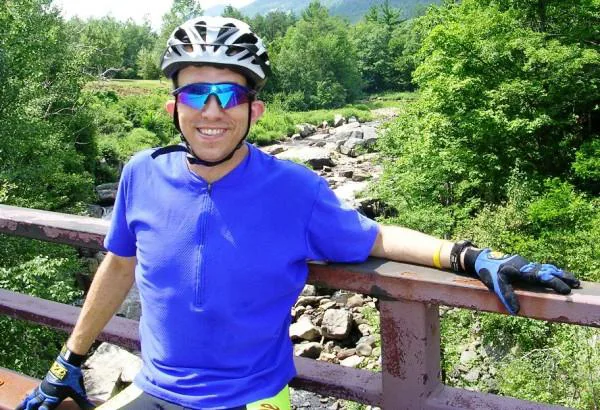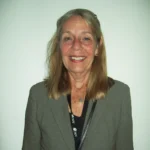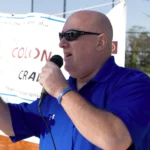A Firefighter Who Fought His Cancer

Carolyn Meyer Toliver discusses how her son, Jeffrey, lived with a lifelong diagnosis that ultimately took his life. Jeffrey refused to give in, and wanted to remain active as a firefighter despite a risky surgery.
Listen
Transcript
I’m Carolyn Meyer Toliver. And my son’s name is Jeffrey P. Meyer. And he was diagnosed in early childhood with neurofibromatosis. And that was what he had up until he was about 30. And actually had what appeared to be a very mild case. And the first tumor that developed NF tends to produce tumors on the myelin nerve sheath. And they’re normally benign. The first one was removed when he was about 22, didn’t have anything else until he got to his early 30s. And when that one was removed, when they did some in depth biopsies and so on they found out that it was malignant. And that then became an MPNST, malignant peripheral nerve sheath tumor. Which is a very rare complication of neurofibromatosis occurring in about 1 percent of those that have it. As before he had the diagnosis of cancer he just pretty much dealt with the neurofibromatosis with the attitude of if I get a tumor, I get it removed and I go on. And that was his attitude all the time. When they took the first tumor out, he had to have some physical therapy and went right back to doing his marathons and his triathlons and that type of thing.
When they diagnosed the cancer he made up his mind that he was just going to get it out, and it was going to be cured, and that was going to be the end of it. The doctors did tell him that there was very little chance that he would survive, and that the only way that he could survive, It was a 20 percent chance of survival, was to have a surgery that would remove his left leg, his hip, and half his pelvis. And because he wanted to stay active, he wanted to continue working with the fire department, do firefighting, and his sports and so on, he asked if they would please try to save his leg. And so, he spent the next three years with several surgeries multiple. MRIs and PET scans, and in the last year and a half, a tremendous amount of pain medications.
To the point where nobody could figure out how he was still functioning. And yet he was still Working on fundraising for the Ulman Cancer Fund. He still was at the fire department several days a week, helping with equipment and that type of thing. Still taking classes to increase his background in firefighting. He had a master’s degree already. And in fact, the day that He died which was about two weeks after he started a new chemo. He was walking to the doctor’s office for a checkup, and he was scheduled that night to meet with the Ullman Cancer Fund on their booty organizing committee. So he was active right up until the minute he died.
It was about a year and a half after he died, and I thought, I wonder how many people still remember. And, uh, they’re going to go on with their life, and so on. And the fire department got in touch with me and said that they had decided that they wanted to create an award in his honor. And so they now give out an annual reward, the Jeffrey P. Meyer Probationer of the Year Award. And there’s a plaque that’s in, I think, the county fire department, so that everybody can see it with the name of each of the people that get the award each year.
But they wanted to do something to preserve his memory. They also have a stone in a memory garden outside the fire department for him as well. And then Peggy Wallace from Shands Hospital in the University of Florida, who’s a researcher in NF, and Jeff had made sure that every one of the tumors that he had removed, some of it was sent to her for her research. They’re still using his tumors, she told me that, because they have enough supply, because they take such thin slices, I guess, to go on for years using his tumors. And she’s going to make a notation in each of her research publications that the tumor tissue that was used was donated by Jeffrey. When he was at the university, she had him come into her medical classes and talk to them about what it was like to live with this kind of a disease.
He felt that information, getting it out, was really important. So I don’t have to do it. The NF Foundation, the Children’s Tumor Foundation, is going to memorialize him on their website and the president of the association has a blog and he’s going to have Jeff up there as well because they feel that what he did and how he did it would be an inspiration for others that are fighting cancer.
He didn’t talk about himself much and he actually he was embarrassed. By having people, talk about him and wanting to know what he did and all that kind of thing. He wanted to do things quietly and just keep on doing them. But the biggest thing I think that he advocated One was that, and this is why he joined the Ullman Cancer Group, young adults with cancer. have a tremendously difficult time, and people don’t tend to focus on it. They feel so, so sorry for the little babies and little children, and of course you would, who have cancer, and for the adults who, in the middle of their life, their parents and so on. But somebody in their 20s or early 30s who’s diagnosed with cancer loses not only The things that they have currently, but they lose the ability to establish themselves in a career, a, to have a family. In Jeff’s case a girl he was dating couldn’t handle the fact that he had cancer, They’re not going to have children. They lose everything. They lose a whole future. And they don’t have a chance to, get past the 20s get into the stable adulthood where they’d have the family and the career and all of that. So it really tears their life apart and he wanted people to realize that.
He lived life. I guess that’s the best thing. Jeff was never afraid to try anything. If he had to do it on his own, that was okay. If there was a concert coming into town that he wanted to see, he’d go by himself if he couldn’t find anybody to go with him. And one of his friends always said he never left alone, though he always had a few new friends by the time he left. He wanted to get up in that helicopter, and he got a chance to do that. learned how to fly a plane. He was a pretty accomplished horseman dressage and show jumping. He’d just about tried everything and anything he tried to seize the day, and cancer was not going to stop that.
Yeah, you have cancer, so you deal with it, but you live. And you don’t live with the idea, well I’m, I’m gonna die pretty soon so I’ve got to cram all this in. You live just for the joy of living. He would get up into New York City. And he’d call me like about every two hours to tell me what he was doing.
I traveled the country and I visited New York through him. He’d call me and he’d tell me I’m doing this or I’m doing that. And one of the biggest things, he’d call me in the morning and he’d here I am with my expensive New York City breakfast. For 2. 50 I’ve got a bagel and cream cheese and a cup of coffee and I’m wandering through Soho and, things like that.
He just enjoyed every little thing.






